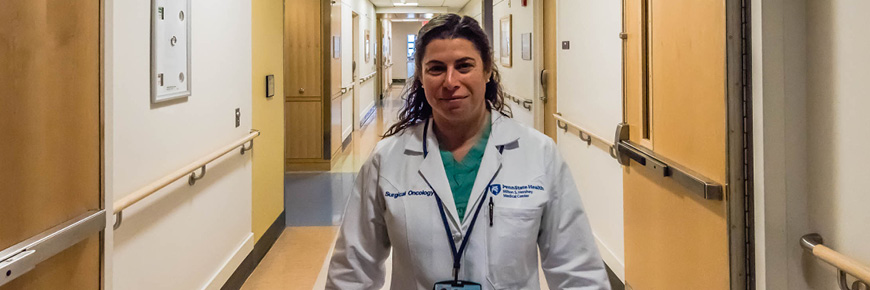Medical Oncology - Penn State Cancer Institute
Medical Oncology

Meet your partners in cutting-edge cures
The medical oncology team is your partner in care. We hope that your experience here will exceed your expectations.
Chemotherapy is the use of medications to treat cancer. Depending on the type of cancer being treated and the stage of the disease, chemotherapy is used to cure the cancer, control the spread or growth of the cancer cells, or ease symptoms of the disease and improve quality of life when cure is no longer the goal.
The medications can be given by mouth, by injection, or through an intravenous (IV) catheter. Chemotherapy acts to destroy rapidly dividing cells or to interfere with a critical pathway needed for the cancer cell to survive. Different medications act differently within the body and, therefore can cause a variety of side effects. Although some side effects are common, the presence or intensity of side effects can vary from one person to another. It is important not to compare yourself to another person receiving chemotherapy. If you are experiencing symptoms, or have concerns, please report these to your nurse or physician.
Your medical oncologist will talk to you about your chemotherapy treatment options. When the treatment regimen has been decided, the physician and/or nurse will give you information about the specific medications you will receive, how these medications will be administered, what monitoring will be necessary (i.e. frequency of labs and scans) and about potential side effects. You will also be given instructions about what symptoms to watch for and when to report symptoms to the nurse/physician. Ways to manage symptoms at home will also be discussed.
An excellent resource for information about chemotherapy and management of common side effects is listed below. This web site links to the National Cancer Institute where you will find additional patient education publications. As you read about the type of cancer you have and about treatments and side effects, please feel free to ask questions of your nurse or physician to learn what pertains to you, what does not, and to clarify any information you are having difficulty understanding. Our goal is to provide you with the information and support needed to get you through this challenging time.
Calls received in medical oncology after 4:00 p.m. may not be answered until the next business day. If you have an urgent medical need that must be addressed immediately, you may page the nurse coordinator during normal business hours. For emergency or other serious health issues after normal business hours, on weekends or holidays, please call 717-531-6585 (select option 4) to be connected to our after hour’s nurse triage care line. Be prepared to give your name, your physician’s name, the disease for which you are receiving care and what medical issue you are experiencing (the reason for your call). Depending on the problem you are experiencing, you may be directed to go to the Emergency Room.
